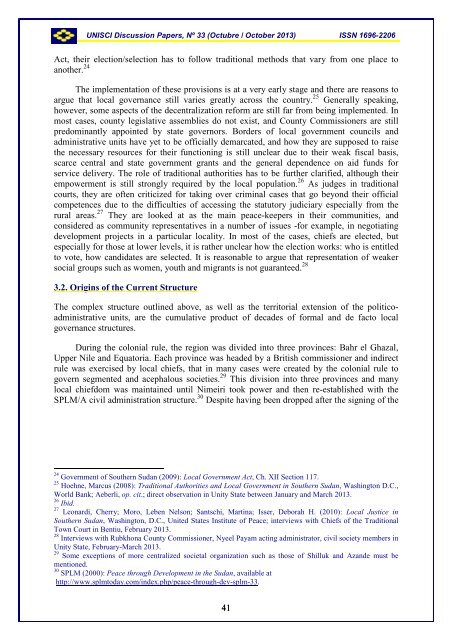UNISCI - Universidad Complutense de Madrid
UNISCI - Universidad Complutense de Madrid
UNISCI - Universidad Complutense de Madrid
You also want an ePaper? Increase the reach of your titles
YUMPU automatically turns print PDFs into web optimized ePapers that Google loves.
<strong>UNISCI</strong> Discussion Papers, Nº 33 (Octubre / October 2013) ISSN 1696-2206Act, their election/selection has to follow traditional methods that vary from one place toanother. 24The implementation of these provisions is at a very early stage and there are reasons toargue that local governance still varies greatly across the country. 25 Generally speaking,however, some aspects of the <strong>de</strong>centralization reform are still far from being implemented. Inmost cases, county legislative assemblies do not exist, and County Commissioners are stillpredominantly appointed by state governors. Bor<strong>de</strong>rs of local government councils andadministrative units have yet to be officially <strong>de</strong>marcated, and how they are supposed to raisethe necessary resources for their functioning is still unclear due to their weak fiscal basis,scarce central and state government grants and the general <strong>de</strong>pen<strong>de</strong>nce on aid funds forservice <strong>de</strong>livery. The role of traditional authorities has to be further clarified, although theirempowerment is still strongly required by the local population. 26 As judges in traditionalcourts, they are often criticized for taking over criminal cases that go beyond their officialcompetences due to the difficulties of accessing the statutory judiciary especially from therural areas. 27 They are looked at as the main peace-keepers in their communities, andconsi<strong>de</strong>red as community representatives in a number of issues -for example, in negotiating<strong>de</strong>velopment projects in a particular locality. In most of the cases, chiefs are elected, butespecially for those at lower levels, it is rather unclear how the election works: who is entitledto vote, how candidates are selected. It is reasonable to argue that representation of weakersocial groups such as women, youth and migrants is not guaranteed. 283.2. Origins of the Current StructureThe complex structure outlined above, as well as the territorial extension of the politicoadministrativeunits, are the cumulative product of <strong>de</strong>ca<strong>de</strong>s of formal and <strong>de</strong> facto localgovernance structures.During the colonial rule, the region was divi<strong>de</strong>d into three provinces: Bahr el Ghazal,Upper Nile and Equatoria. Each province was hea<strong>de</strong>d by a British commissioner and indirectrule was exercised by local chiefs, that in many cases were created by the colonial rule togovern segmented and acephalous societies. 29 This division into three provinces and manylocal chiefdom was maintained until Nimeiri took power and then re-established with theSPLM/A civil administration structure. 30 Despite having been dropped after the signing of the24 Government of Southern Sudan (2009): Local Government Act, Ch. XII Section 117.25 Hoehne, Marcus (2008): Traditional Authorities and Local Government in Southern Sudan, Washington D.C.,World Bank; Aeberli, op. cit.; direct observation in Unity State between January and March 2013.26 Ibid.27 Leonardi, Cherry; Moro, Leben Nelson; Santschi, Martina; Isser, Deborah H. (2010): Local Justice inSouthern Sudan, Washington, D.C., United States Institute of Peace; interviews with Chiefs of the TraditionalTown Court in Bentiu, February 2013.28 Interviews with Rubkhona County Commissioner, Nyeel Payam acting administrator, civil society members inUnity State, February-March 2013.29 Some exceptions of more centralized societal organization such as those of Shilluk and Azan<strong>de</strong> must bementioned.30 SPLM (2000): Peace through Development in the Sudan, available athttp://www.splmtoday.com/in<strong>de</strong>x.php/peace-through-<strong>de</strong>v-splm-33.41
















